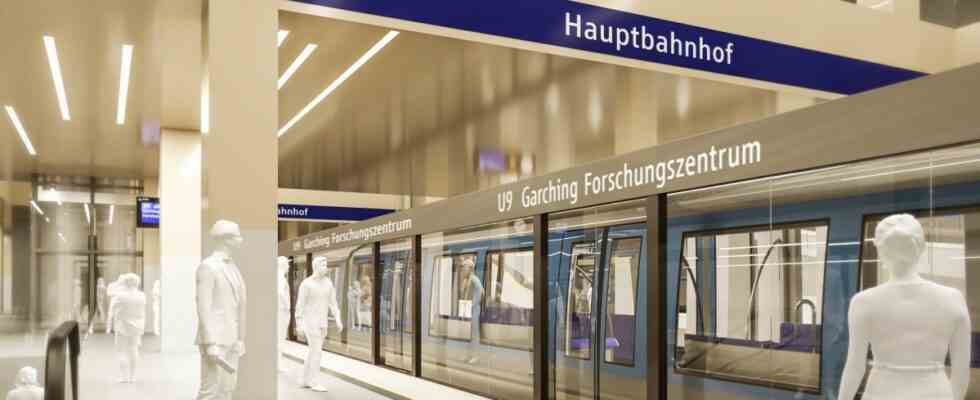Munich’s mayor Dieter Reiter (SPD) is not in good spirits with the board of directors of Deutsche Bahn (DB) because of the disaster on the second main route of the S-Bahn. Now the already tense relationship could deteriorate even further. Because the state-owned company DB puts the city under massive pressure when expanding local transport in Munich. According to Deutsche Bahn, if the city council were to cancel the planned U9, this would have significant consequences for the construction of the second trunk line. The city council wants to set the course for the U9 this Wednesday.
The second main route, which is already much more expensive and much later than originally planned, would be “delayed and more expensive” without the U9. The railways announced this at the request of the SZ. According to the city, Deutsche Bahn has already “registered possible claims of around 700 million euros”. This is in the event that the city does not build the planned U9 stop at the main station. This stop on the U9 is part of the current planning for the second main line.
“A rejection of the U9 would involve a great deal of effort for another rescheduling at the main station,” said the railway in response to the SZ request. The two projects, the U9 and the second trunk route, are closely linked at the main station. One project depends on the other and vice versa. The city treasury informed the city council in a submission for the meeting this Wednesday that the city’s railway could charge 700 million euros if the U9 were to be cancelled.
The city takes the threat of the railway very seriously
According to the city treasury headed by Christoph Frey (SPD), there are convincing counter-arguments against “possible claims for payment by DB”. In its proposal for the city council, the city treasury refers to a corresponding legal opinion. The fact that such a report already exists documents how seriously the city takes the threat to the railway and how serious the situation is.
The city council is even more in a dilemma due to the threat of the railway. The city treasury, which is very concerned about Munich’s finances, is asking the city parliament not to build the U9 stop at the main station, which has been calculated at 560 million euros. Formally, the city council is now only concerned with this stop, but in fact with the entire U9 right through the city center. The new subway is expected to relieve traffic at some point in the next decade. If the stop at the main train station were to be canceled, the entire project would be null and void.
Despite the chamberlain’s warning, the city’s finance minister, so to speak, about unmanageable debts, a majority is emerging for the U9. The green-red coalition and Mayor Dieter Reiter support the new line, as does the third major faction, the CSU. But it remains to be seen how the Greens, SPD and CSU will react to the threat from the railways. And what effect the appeal of the city treasury has.
If the city council does not release the money for the U9 stop at the main station, the time window for the expansion of the Munich subway will close for several decades. Conversely, there is a risk that the city will run out of money for the U9, which is estimated at up to ten billion euros, due to a lack of federal funding. The 560 million euros for the U9 stop at the main station would then be wasted money.
Mayor Reiter says there is “undoubtedly a residual financial risk”
In any case, Mayor Reiter stands by the construction of the U9. As is his job, the chamberlain has given a detailed statement on the financial risks. “I pointed out these risks myself in the run-up to the decision,” explains Reiter. The mayor concedes that there is “undoubtedly a residual financial risk” in terms of adequate federal and state funding. Nevertheless, he will vote “after intensive consideration of opportunities and risks” for the precautionary construction of the U9 stop at the main station.
In his words, Reiter is concerned with “not preventing a sustainable subway network with the U9 right now”. If the city, together with the federal and state governments, seriously want a turnaround in traffic, projects such as the U9 and the second main S-Bahn line would have to “be implemented and jointly financed”. The Greens, in turn, blame the dilemma on Federal Transport Minister Volker Wissing (FDP). Wissing “persistently avoids making a reliable statement” about a federal grant.
Mona Fuchs, spokeswoman for the Greens/Pink List faction, describes the U9 as essential for a traffic turnaround. “We are convinced that in the medium term the federal government will not be able to avoid funding the U9 proportionately together with the Free State.” Minister of Transport Wissing “should do his homework as soon as possible”. Nikolaus Gradl, transport policy spokesman for the SPD/Volt parliamentary group, is also pushing for a vote for the U9. The existing lines of the subway are “at the limit, especially in the rush hours”. Real relief in the city center will only bring a new north-south connection via the main station.
The Christian Socials also stick to their yes for the U9. “Anyone who talks about a turnaround in traffic must first think of the subway, it is the backbone of the MVG network,” says parliamentary group leader Manuel Pretzl. “The construction of the U9 is the most important investment in our future transport network. It was never planned for the city to finance it alone.” Pretzl demands that anyone who wants the traffic turnaround now has to “take the money into their own hands”. The Left/The Party parliamentary group wants to vote against it. “We won’t let the railways blackmail us,” said parliamentary group spokesman Stefan Jagel.

